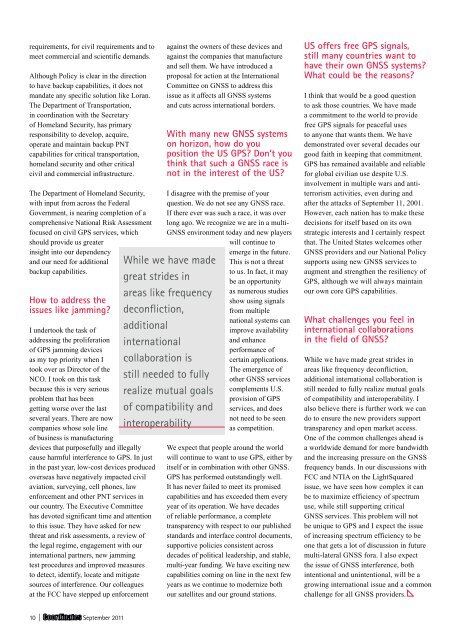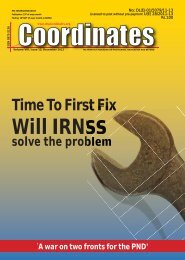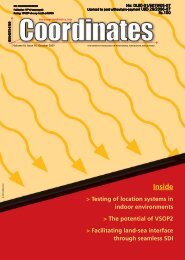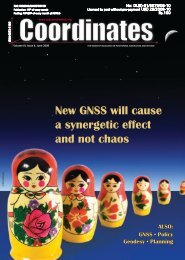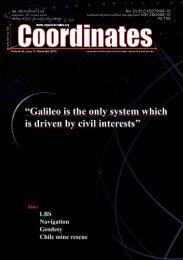Download - Coordinates
Download - Coordinates
Download - Coordinates
Create successful ePaper yourself
Turn your PDF publications into a flip-book with our unique Google optimized e-Paper software.
equirements, for civil requirements and to<br />
meet commercial and scientific demands.<br />
Although Policy is clear in the direction<br />
to have backup capabilities, it does not<br />
mandate any specific solution like Loran.<br />
The Department of Transportation,<br />
in coordination with the Secretary<br />
of Homeland Security, has primary<br />
responsibility to develop, acquire,<br />
operate and maintain backup PNT<br />
capabilities for critical transportation,<br />
homeland security and other critical<br />
civil and commercial infrastructure.<br />
The Department of Homeland Security,<br />
with input from across the Federal<br />
Government, is nearing completion of a<br />
comprehensive National Risk Assessment<br />
focused on civil GPS services, which<br />
should provide us greater<br />
insight into our dependency<br />
and our need for additional<br />
backup capabilities.<br />
How to address the<br />
issues like jamming?<br />
I undertook the task of<br />
addressing the proliferation<br />
of GPS jamming devices<br />
as my top priority when I<br />
took over as Director of the<br />
NCO. I took on this task<br />
because this is very serious<br />
problem that has been<br />
getting worse over the last<br />
several years. There are now<br />
companies whose sole line<br />
of business is manufacturing<br />
devices that purposefully and illegally<br />
cause harmful interference to GPS. In just<br />
in the past year, low-cost devices produced<br />
overseas have negatively impacted civil<br />
aviation, surveying, cell phones, law<br />
enforcement and other PNT services in<br />
our country. The Executive Committee<br />
has devoted significant time and attention<br />
to this issue. They have asked for new<br />
threat and risk assessments, a review of<br />
the legal regime, engagement with our<br />
international partners, new jamming<br />
test procedures and improved measures<br />
to detect, identify, locate and mitigate<br />
sources of interference. Our colleagues<br />
at the FCC have stepped up enforcement<br />
10 | September 2011<br />
against the owners of these devices and<br />
against the companies that manufacture<br />
and sell them. We have introduced a<br />
proposal for action at the International<br />
Committee on GNSS to address this<br />
issue as it affects all GNSS systems<br />
and cuts across international borders.<br />
With many new GNSS systems<br />
on horizon, how do you<br />
position the US GPS? Don’t you<br />
think that such a GNSS race is<br />
not in the interest of the US?<br />
I disagree with the premise of your<br />
question. We do not see any GNSS race.<br />
If there ever was such a race, it was over<br />
long ago. We recognize we are in a multi-<br />
GNSS environment today and new players<br />
will continue to<br />
While we have made<br />
great strides in<br />
areas like frequency<br />
deconfliction,<br />
additional<br />
international<br />
collaboration is<br />
still needed to fully<br />
realize mutual goals<br />
of compatibility and<br />
interoperability<br />
emerge in the future.<br />
This is not a threat<br />
to us. In fact, it may<br />
be an opportunity<br />
as numerous studies<br />
show using signals<br />
from multiple<br />
national systems can<br />
improve availability<br />
and enhance<br />
performance of<br />
certain applications.<br />
The emergence of<br />
other GNSS services<br />
complements U.S.<br />
provision of GPS<br />
services, and does<br />
not need to be seen<br />
as competition.<br />
We expect that people around the world<br />
will continue to want to use GPS, either by<br />
itself or in combination with other GNSS.<br />
GPS has performed outstandingly well.<br />
It has never failed to meet its promised<br />
capabilities and has exceeded them every<br />
year of its operation. We have decades<br />
of reliable performance, a complete<br />
transparency with respect to our published<br />
standards and interface control documents,<br />
supportive policies consistent across<br />
decades of political leadership, and stable,<br />
multi-year funding. We have exciting new<br />
capabilities coming on line in the next few<br />
years as we continue to modernize both<br />
our satellites and our ground stations.<br />
US offers free GPS signals,<br />
still many countries want to<br />
have their own GNSS systems?<br />
What could be the reasons?<br />
I think that would be a good question<br />
to ask those countries. We have made<br />
a commitment to the world to provide<br />
free GPS signals for peaceful uses<br />
to anyone that wants them. We have<br />
demonstrated over several decades our<br />
good faith in keeping that commitment.<br />
GPS has remained available and reliable<br />
for global civilian use despite U.S.<br />
involvement in multiple wars and antiterrorism<br />
activities, even during and<br />
after the attacks of September 11, 2001.<br />
However, each nation has to make these<br />
decisions for itself based on its own<br />
strategic interests and I certainly respect<br />
that. The United States welcomes other<br />
GNSS providers and our National Policy<br />
supports using new GNSS services to<br />
augment and strengthen the resiliency of<br />
GPS, although we will always maintain<br />
our own core GPS capabilities.<br />
What challenges you feel in<br />
international collaborations<br />
in the field of GNSS?<br />
While we have made great strides in<br />
areas like frequency deconfliction,<br />
additional international collaboration is<br />
still needed to fully realize mutual goals<br />
of compatibility and interoperability. I<br />
also believe there is further work we can<br />
do to ensure the new providers support<br />
transparency and open market access.<br />
One of the common challenges ahead is<br />
a worldwide demand for more bandwidth<br />
and the increasing pressure on the GNSS<br />
frequency bands. In our discussions with<br />
FCC and NTIA on the LightSquared<br />
issue, we have seen how complex it can<br />
be to maximize efficiency of spectrum<br />
use, while still supporting critical<br />
GNSS services. This problem will not<br />
be unique to GPS and I expect the issue<br />
of increasing spectrum efficiency to be<br />
one that gets a lot of discussion in future<br />
multi-lateral GNSS fora. I also expect<br />
the issue of GNSS interference, both<br />
intentional and unintentional, will be a<br />
growing international issue and a common<br />
challenge for all GNSS providers.


